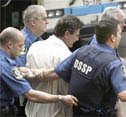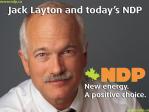Gomery inquiry part deux .. just how explosive is the new testimony?
Apr 4th, 2005 | By Counterweights Editors | Category: Ottawa Scene
Someone or something in Ottawa (or somewhere?) almost seems determined that Canada is going to have a fresh federal general election very soon – less than a year after the last one.
Speculation about how the opposition will unite to defeat Paul Martin’s Liberal minority government over its neo-Machiavellian linking of the Kyoto Accord with its budget legislation has apparently abated. But it has quickly been replaced by much more dramatic talk – about an election somehow flowing from “explosive new testimony” before the Gomery inquiry into the sponsorship scandal, currently taking evidence in Montreal.
To add a little exotic southern fuel to the fire, US right-wing websites have now published some vague taste of the explosive new testimony – which the Gomery inquiry itself has placed under a publication ban in Canada, so as not to prejudice upcoming criminal trials of key witnesses.
 Even in Canada Mr. Justice Gomery’s publication ban does not seem to be working very well. Very early on the morning of April 4, 2005 Jane Taber of the Globe and Mail was reporting that “most politicos in Ottawa are aware of the substance, if not the minute details, of last week’s testimony. Transcripts are circulating among some staffers and the details are being talked about on cellphones and through e-mail.”
Even in Canada Mr. Justice Gomery’s publication ban does not seem to be working very well. Very early on the morning of April 4, 2005 Jane Taber of the Globe and Mail was reporting that “most politicos in Ottawa are aware of the substance, if not the minute details, of last week’s testimony. Transcripts are circulating among some staffers and the details are being talked about on cellphones and through e-mail.”
The testimony that has caused all the stir is from Quebec advertising executive Jean Brault, who is also facing an upcoming criminal trial on six counts of fraud, relating to exactly how his advertising agency, Groupaction, handled contracts under the federal sponsorship program. Given that M. Brault has long been known to face such criminal charges, it is arguably not too surprising that he has been telling the Gomery inquiry some rather salacious things. (Or that his current appearance before the inquiry is proving an especially stressful experience for him.)
The reports of what Jean Brault has so far had to say on US websites are based on a single source – leaks from “a friend of mine … in a position to have the information.” They say generally that Brault has “revealed a massive pattern of corruption going to the highest levels of the Liberal party and government.” But the skimpy details they provide about what he has actually said so far – and especially about such things as exact amounts of money involved, in various directions – still seem far from necessarily adding up to any such sweeping conclusion.
 For some time now, it has been clear enough to any mere member of the taxpaying democratic electorate in Canada that a certain amount of hanky-panky that ought not to have gone on probably did go on in the sponsorship program, under the pressures of the moment in the struggle against the mindless designs of the Quebec sovereigntist movement, or for whatever other reasons. That is why criminal charges have already been laid against Jean Brault and others.
For some time now, it has been clear enough to any mere member of the taxpaying democratic electorate in Canada that a certain amount of hanky-panky that ought not to have gone on probably did go on in the sponsorship program, under the pressures of the moment in the struggle against the mindless designs of the Quebec sovereigntist movement, or for whatever other reasons. That is why criminal charges have already been laid against Jean Brault and others.
Given all the current confusion, one no doubt has to allow that M. Brault’s ultimate testimony, along with that of a few others, just may finally suggest considerably more than mere hanky-panky of the sort that should not happen but that everyone seriously familiar with politics in even the most democratic countries of the present and the past knows does happen often enough (and without suggesting any systemic institutional corruption on an unprecedented scale). As Jane Taber of the Globe and Mail has reported as well: “NDP Leader Jack Layton told CTV’s Question Period” this past Sunday “that the Gomery inquiry appears to be on the threshold’ of exposing Liberal corruption.”
But it also remains true that we have heard stories like this about the sponsorship scandal more than once before, only to find that they do shrink to much smaller and less troubling proportions when all the exact details are laid out neatly in a row. Virtually none of the apparent specific details cited on Captain’s Quarters – the US website apparently at the centre of the recent wider public reporting of Jean Brault’s testimony – seem to suggest anything deeply outrageous, or fundamentally inconsistent with some mere hanky-panky scenario. (And for the moment it does seem to remain unclear as well how any of this relates exactly to the present as opposed to the former Liberal government in Ottawa.)
 Captain’s Quarters also ended its original report on the Brault testimony on this highly speculative and ideologically charged note: “This is just the beginning of Brault’s testimony. If the Gomery Commission can corroborate Brault, then the reek of corruption goes through all levels of the Liberal party and may explain their ability to out-campaign the Conservatives. After all, they’ve siphoned off hundreds of millions of government dollars to promote their own party and to guarantee their monopoly on power. They hijacked the Canadian tax base to fund their own campaigns and hide the financial trail.”
Captain’s Quarters also ended its original report on the Brault testimony on this highly speculative and ideologically charged note: “This is just the beginning of Brault’s testimony. If the Gomery Commission can corroborate Brault, then the reek of corruption goes through all levels of the Liberal party and may explain their ability to out-campaign the Conservatives. After all, they’ve siphoned off hundreds of millions of government dollars to promote their own party and to guarantee their monopoly on power. They hijacked the Canadian tax base to fund their own campaigns and hide the financial trail.”
This seems rather wildly hyperbolic at best – even on the worst-case scenario of what the Gomery inquiry may finally report about the extent of “Liberal corruption.” And until we do have a chance to look seriously at whatever solid data the inquiry may or may not come up with, it is still hard to forget another critical characterization of the Canadian political tradition that goes back to the mythical origins of the present confederation in the late 19th century.
As the very pure, high-minded, and often publicly critical great Canadian economist Harold Innis reminded us more than half a century ago now, back in the founding days of the great Conservative John A. Macdonald one sharp overseas observer of Canadian politics felt compelled to note the “malicious credulity of Canadian party spirit and the extreme lengths to which party warfare is carried at the instigation of a most virulent and unscrupulous press.”
 It may be that the Gomery inquiry is about to uncover some truly outrageous degree of unconscionable corruption in the Liberal party that has governed Canada for some two-thirds of the past century or so. And if it does, that could even prove to be a great watershed in our modern political history, of a sort we no doubt do sorely enough need, from one direction or another.
It may be that the Gomery inquiry is about to uncover some truly outrageous degree of unconscionable corruption in the Liberal party that has governed Canada for some two-thirds of the past century or so. And if it does, that could even prove to be a great watershed in our modern political history, of a sort we no doubt do sorely enough need, from one direction or another.
Or, it just may be that Canadian politics still hasn’t managed to get very far beyond its 19th century origins – with its malicious credulity of party spirit and extreme lengths of party warfare. Maybe what we are seeing in Ottawa’s current obsession with a fresh general election so soon after the last one is another thing that troubled Harold Innis more than half a century ago: “the exhaustion of political capacity” in Canada – in the face of yet another historic wave of fresh real-world challenges, at home and abroad. (From Canada-US border issues and international terrorism in the Middle East, to health care, education, economic security in a changing world economy, and Canadian democratic reform.)
In the eyes of the taxpaying electorate, coast to coast to coast, it may finally prove to be that it is these challenges our politicians ought to be worrying about most. And it is still not easy to see how an election very soon (or even as late as early this fall?) is going to bring any combination of the current federal parties closer to doing a better job on securing the real future of the people of Canada than they are doing right now.
 In any event, most of the people of Canada today are not exactly babes in the woods. For the moment at least, recent Conservative administrations in various provinces do not seem to have been notably more “ethical” than the Liberals in Ottawa, when it comes to keeping immaculate track of all the nickels and dimes. The Gomery inquiry is probably going to have to come up with considerably more than vague rumours of explosive testimony to change this picture dramatically. Until then at least, most voters will likely enough remain most interested in enjoying the arrival of spring, in ways that have hardly anything to do with politics at all.
In any event, most of the people of Canada today are not exactly babes in the woods. For the moment at least, recent Conservative administrations in various provinces do not seem to have been notably more “ethical” than the Liberals in Ottawa, when it comes to keeping immaculate track of all the nickels and dimes. The Gomery inquiry is probably going to have to come up with considerably more than vague rumours of explosive testimony to change this picture dramatically. Until then at least, most voters will likely enough remain most interested in enjoying the arrival of spring, in ways that have hardly anything to do with politics at all.
* * * * * *
Note the subsequent noon-April 4 update on the issue in the Globe and Mail by Tu Thanh Ha, “Grits ask RCMP to probe whether party was victim.” It now does seem clear enough that the people of Canada have not heard the last of all this, like it or not.
For still more recent developments, especially on the prospects that Mr. Justice Gomery will lift the publication ban on the Brault testimony in Canada, see Allison Dunfield’s Globe and Mail piece, “Decision on Gomery publication ban delayed,” on April 6. On election prospects, see also Ms. Dunfield’s “Harper won’t work with Bloc to force election” from the same time and place.

